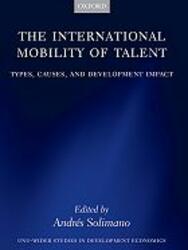Book
The International Mobility of Talent
Types, Causes, and Development Impact
Entrepreneurs, technical experts, professionals, international students, writers, and artists are among the most highly mobile people in the global economy today. These talented elite often originate from developing countries and migrate to industrial economies. Many return home with new ideas, experiences, and capital useful for national development, whilst others remain to produce quality goods and services that are useful everywhere in the global economy. The economic potential of globalization is ultimately dependent on the international mobility of highly talented individuals that transfer knowledge, new technologies, ideas, business capacities, and other creative capabilities. Developing countries and advanced economies may both gain from this mobility if it is effectively and smartly managed. This volume, with original contributions from outstanding international experts in the subject, provides a novel analysis of the main determinants and development impact of talent mobility in the global economy.
 Join the network
Join the network